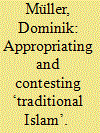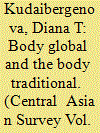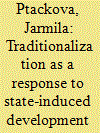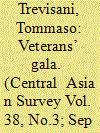|
|
|
Sort Order |
|
|
|
Items / Page
|
|
|
|
|
|
|
| Srl | Item |
| 1 |
ID:
168833


|
|
|
|
|
| Summary/Abstract |
Based on an ethnographic case study of an Islamic university in Russia, I examine how the state-implemented and bureaucratized traditionalization of Islam in Russia affects the everyday life of Central Asian students and how this project ‘from above’ is entangled with their coping strategies. I show how religious education has become a resource for the state as well as for young students and their parents. The Russian state uses these official religious institutions to control the Muslim population by creating and promoting a state-approved version of ‘traditional Islam’ and producing official religious specialists. For the young Muslim students, however, Islamic education provides, in addition to religious knowledge, access to networks, social security and new economic opportunities. It thereby offers a way to cope with the uncertainty caused by high unemployment rates and other socio-economic difficulties among young people.
|
|
|
|
|
|
|
|
|
|
|
|
|
|
|
|
| 2 |
ID:
168831


|
|
|
|
|
| Summary/Abstract |
What is the power of social media in defining and policing sexual identities and bodily expressions, and what are their connections to understanding nation, power and self in authoritarian contexts? Through the study of popular Instagram accounts in Kazakhstan and Russia, I argue that these sites serve as spaces of visualization and re-creation of new forms of ‘acceptable’ behaviour and lifestyles, that on the one hand may lead to new globalized visions of sexual identity and the body while on the other promoting localized conflict and resentment online, triggered by online users’ fear of losing their ‘national culture’ in these global trends. While many resort to policing gender norms and heteronormative body images online, influencers and Instagrammers from Russia and Kazakhstan take an active part in resisting these frameworks and categories.
|
|
|
|
|
|
|
|
|
|
|
|
|
|
|
|
| 3 |
ID:
168828


|
|
|
|
|
| Summary/Abstract |
Over the last two centuries, ‘tradition’1 has been invoked in Central Asia by Russian and Soviet regimes, as well as by local Central Asian elites, largely in two ways: either as a deficiency to be overcome (often in juxtaposition to an aspirational ‘modernity’) or as a quality to be embraced (often in alignment with nationalism). The two are not mutually exclusive or even strictly separate, but the distinction serves well to outline general themes and dynamics in the work of tradition. It is likewise difficult to make clear distinctions between academic analyses and everyday invocations of the term, as they play off one another, and entirely new genres of writing and practice are still emerging. The centrality of tradition in today’s Central Asia cannot, however, be denied.
|
|
|
|
|
|
|
|
|
|
|
|
|
|
|
|
| 4 |
ID:
168834


|
|
|
|
|
| Summary/Abstract |
The current state-induced and top-down-implemented development and modernization of the predominantly rural areas of western China can be perceived as a clear demonstration of Chinese power in Tibetan areas, resulting in the repression of expressions of minority culture. This article argues that the local population’s various practices of traditionalization, as demonstrated through an emphasis on the maintenance or (re)invention of representative cultural forms can be understood as efforts to counteract the socio-economic and cultural assimilation measures or even as a form of political resistance. At the same time, in the context of the economic opportunities brought on by the rapid development, in tourism for example, traditionalization has become an important economic asset for both the state and local Tibetans. These (revived) traditions could enhance cultural awareness among visitors to minority areas and strengthen local people’s sense of cultural security and their self-understanding as Tibetans.
|
|
|
|
|
|
|
|
|
|
|
|
|
|
|
|
| 5 |
ID:
168830


|
|
|
|
|
| Summary/Abstract |
This article aims to show how traditionalization is enforced by women in Tajikistan in the realm of marriage, focusing on the economic dimension of life cycle rituals: ritual expenditure and gift-giving. It shows that from women’s points of view, performing ceremonial competition may itself be a resource to recover their reputation, for example when a matrimonial rupture has harmed it. Focusing on single mothers, it demonstrates how practices of traditionalization performed by women can be directed at addressing gender constraints and stereotypes, such as the normative relation between marriage and femininity, and how they may also secure women’s separate sphere of competence and relative financial autonomy.
|
|
|
|
|
|
|
|
|
|
|
|
|
|
|
|
| 6 |
ID:
168832


|
|
|
|
|
| Summary/Abstract |
Since its privatization in 1995, Kazakhstan’s largest steel mill has been in a restructuring process characterized by workforce reduction, augmented pressure on remaining jobs and labour conflict over wages, work conditions and corporate social responsibility. In 2013, in an attempt to re-establish harmonious relationships with workers, management invited the mill’s former labour aristocracy to join a newly established veterans’ council, a forum resembling traditional aksakal councils, to discuss the company’s difficult situation. In the context of a banquet in honour of the veterans, tradition became the contested terrain over which labour and capital struggled to endorse their own visions of the industrial future. As corporate capitalist visions of efficiency and professionalism, ethno-national concerns for harmony and stability, and practices rooted in the Soviet labour legacy clash, tradition is staged by actors as a practice which can either affirm or challenge industrial leadership in a labour conflict.
|
|
|
|
|
|
|
|
|
|
|
|
|
|
|
|
| 7 |
ID:
168829


|
|
|
|
|
| Summary/Abstract |
Tradition has come to play an important role throughout Central Asia in a number of new ways since independence, but has been predominantly investigated regarding nation building. In this article, we show how tradition is being used operationally in the context of activism and political conflict. We expose the various motivations and tactics pursued by aksakals (lit., whitebeards) and by a movement of mature women called OBON (lit., Women Units for Special Purposes) as they participate in politics, and the role tradition plays in these activities. We argue that aksakals actively draw on tradition even in the political realm to avoid being derogatorily labelled ‘elders on duty’, whereas OBON women position themselves as economic and political actors but are subjected to discourses and practices of tradition by others. While both aksakals and OBON women have been central to political action in Kyrgyzstan in the last two decades, this article is the first to compare and contrast these two categories of unusual activists. The comparison reveals a perpetuation of culturally recognized gender roles even when these actors go beyond their ‘traditional’ realms of competence.
|
|
|
|
|
|
|
|
|
|
|
|
|
|
|
|
|
|
|
|
|